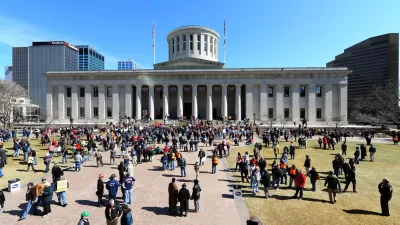In a guest editorial for Rust Wire, Nick Gurich examines the ways in which LEED discounts the environmental benefits of historic preservation and adaptive reuse
According to Gurich, preservationists have engaged with the U.S. Green Building Council in the past to find a better way to acknowledge and encourage the environmental benefits that accompany historic preservation and adaptive reuse in their LEED rating system, with no substantive outcome.
"The problem with LEED, from the perspective of a preservationist, is that it gives little credit for the embodied energy contained in an historic building (or any building for that matter). This energy, which is not only representative of the building materials in a structure but also the work that went into constructing those materials into their current state, is not as easy to measure as say the R-value of a replacement window and therefore have not figured heavily into LEED's equation," writes Gurich.
Citing the widespread acceptance and marketing advantage of LEED certification, Gurich believes that, "Providing developers of historic projects with an easier path to LEED certification would certainly make the reuse of an existing building more financially attractive....[and] will lead to increased preservation and reuse of historic buildings."
With the next iteration of LEED set to be voted on by membership in June, Gurich suggests the avenues to advocate such changes.
FULL STORY: Guest Editorial: Occupy the USGBC! A Call to Arms for Preservationists

Planetizen Federal Action Tracker
A weekly monitor of how Trump’s orders and actions are impacting planners and planning in America.

Map: Where Senate Republicans Want to Sell Your Public Lands
For public land advocates, the Senate Republicans’ proposal to sell millions of acres of public land in the West is “the biggest fight of their careers.”

Restaurant Patios Were a Pandemic Win — Why Were They so Hard to Keep?
Social distancing requirements and changes in travel patterns prompted cities to pilot new uses for street and sidewalk space. Then it got complicated.

Platform Pilsner: Vancouver Transit Agency Releases... a Beer?
TransLink will receive a portion of every sale of the four-pack.

Toronto Weighs Cheaper Transit, Parking Hikes for Major Events
Special event rates would take effect during large festivals, sports games and concerts to ‘discourage driving, manage congestion and free up space for transit.”

Berlin to Consider Car-Free Zone Larger Than Manhattan
The area bound by the 22-mile Ringbahn would still allow 12 uses of a private automobile per year per person, and several other exemptions.
Urban Design for Planners 1: Software Tools
This six-course series explores essential urban design concepts using open source software and equips planners with the tools they need to participate fully in the urban design process.
Planning for Universal Design
Learn the tools for implementing Universal Design in planning regulations.
Heyer Gruel & Associates PA
JM Goldson LLC
Custer County Colorado
City of Camden Redevelopment Agency
City of Astoria
Transportation Research & Education Center (TREC) at Portland State University
Camden Redevelopment Agency
City of Claremont
Municipality of Princeton (NJ)



























